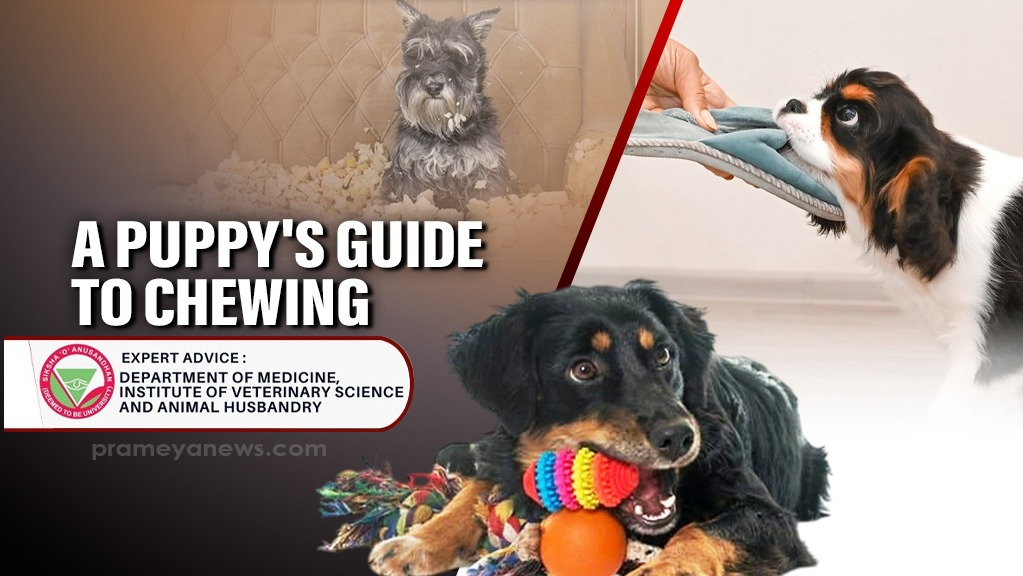Understanding the Teething Process in Puppies
A puppy's intense desire to chew is primarily driven by teething, a process they undergo twice in their early life. Like human babies, puppies develop two distinct sets of teeth in their lifetime.
- Deciduous (Milk) Teeth: Puppies are born without teeth. Their first set, the 28 deciduous or "milk" teeth, begin to erupt at around three weeks of age. This set includes incisors, canines, and premolars. The eruption process is typically complete by the time a puppy is six weeks old. These teeth are noticeably small, white, soft, and have a sharp, needle-like feel.
- Permanent (Adult) Teeth: Around 12 weeks of age, the deciduous teeth start to fall out to make way for the permanent set. It is common for puppies to swallow these baby teeth without any harm. By approximately six months of age, all 42 permanent teeth—comprising 12 incisors, 4 canines, 16 premolars, and 10 molars—should have erupted. This entire period, from the emergence of milk teeth to the settling of adult teeth, is characterized by a strong urge to chew on various objects.
Common symptoms associated with teething include inflamed or red gums, drooling, a reluctance to eat or eating more slowly, bad breath, and general mild irritability.
Factors Influencing Chewing Behavior
While teething is the primary driver, other factors can influence the intensity and nature of a puppy's chewing habits.
- Breed Predisposition: Certain dog breeds are genetically more inclined to be avid chewers. High-energy and inquisitive breeds such as Labrador Retrievers, Golden Retrievers, Beagles, and various Terriers often exhibit strong chewing tendencies. Breeds with powerful jaws, like Pit Bulls, may also chew as a form of stress relief.
- Underlying Health and Behavioral Issues: Sometimes, excessive chewing can signal a deeper problem. These can include gastrointestinal issues like parasites, abdominal pain, or nutritional deficiencies. Stress and other behavioral disorders can also manifest as destructive chewing.
- Dental Abnormalities: Developmental problems can arise during teething. These include persistent deciduous teeth (where milk teeth do not fall out), delayed eruption of permanent teeth, malformed teeth, or malocclusions (improper alignment of the jaw). These issues can be caused by genetic abnormalities or trauma and are more common in certain breeds, such as small or brachycephalic (flat-faced) breeds. Radiographs (X-rays) can help a veterinarian diagnose such conditions.
Effective Management and Preventive Strategies
Managing a puppy's chewing is essential for their safety and the preservation of household items. There is no single method that works for every puppy, so a combination of strategies is often most effective.
- Provide Safe Chew Toys: Offering a variety of safe, durable chew toys is one of the best ways to redirect a puppy's chewing. These toys help soothe their gums and provide mental stimulation. It's important to choose toys appropriate for the puppy's size and chewing strength and to replace any that become damaged to avoid the risk of ingestion and digestive tract issues.
- Environmental Management: Puppy-proofing the home is a critical step. Keep potentially hazardous items like electrical wires, shoes, plastic items, and cloths out of the puppy's reach. This proactive approach prevents destructive behavior and protects the puppy from harm.
- Use of Deterrents: Commercially available bitter-tasting sprays can be applied to items you don't want the puppy to chew. However, these require repeated application and can sometimes cause mild allergic reactions or irritation in some dogs.
- Supervision and Training: Closely supervising a puppy, especially during their most active chewing phases, is crucial. Use soft commands like "leave it" to teach them what is off-limits. Positive reinforcement training helps build good habits. Crating can be a useful temporary management tool, for example, when you cannot supervise the puppy, but it should be a safe, positive space and not used as a long-term solution to prevent chewing, as it could lead to other behavioral issues.
- Proper Nutrition and Breeding Practices: Ensuring a puppy receives a balanced, high-quality diet can help prevent chewing related to nutritional deficiencies. Furthermore, responsible breeding practices can play a role in reducing genetic predispositions to dental problems. Animals with known issues like delayed teeth eruption should not be bred unless the condition was caused by non-hereditary trauma.
In conclusion, chewing is a natural and necessary behavior for puppies that helps them navigate the teething process and relieves anxiety. For dog owners, this phase requires patience, understanding, and proactive management. By providing safe alternatives, managing the puppy's environment, and being observant of any signs that might indicate a more serious underlying issue, owners can guide their pets safely through this critical developmental stage. Consulting with a veterinarian for regular check-ups and personalized advice is always the best course of action to ensure a puppy grows into a healthy, well-adjusted adult dog.
With inputs from Dr. Sonali Sahoo, PhD and Dr. Ritu Gupta, MVSc Assistant Professors, Faculty of Veterinary Science and Animal Husbandry, SOA Deemed University, Bhubaneswar.

